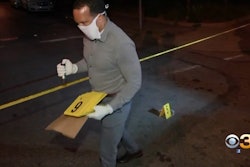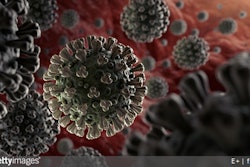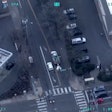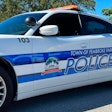Earlier this month POLICE organized a webinar on coronavirus and law enforcement. You can listen to It here: https://event.webcasts.com/viewer/event.jsp?ei=1297823
Dozens of questions were submitted during the live webinar, and we could not get to all of them and we needed to research answers to some of them. This FAQ includes answers from the presenters given during the live event as well as answers from experts who were kind enough to respond to our requests for answers.
LAW:
Does the Families First Coronavirus Response Act (FFCRA) pertain to emergency responders, specifically law enforcement, or are they excluded?
Emergency responders such as law enforcement officers are excluded from coverage by the FFCRA. According to the Department of Labor:
"For the purposes of Employees who may be excluded from Paid Sick Leave or Expanded Family and Medical Leave by their Employer under the FFCRA, an emergency responder is anyone necessary for the provision of transport, care, healthcare, comfort and nutrition of such patients, or others needed for the response to COVID-19. This includes but is not limited to military or national guard, law enforcement officers, correctional institution personnel, fire fighters, emergency medical services personnel, physicians, nurses, public health personnel, emergency medical technicians, paramedics, emergency management personnel, 911 operators, child welfare workers and service providers, public works personnel, and persons with skills or training in operating specialized equipment or other skills needed to provide aid in a declared emergency, as well as individuals who work for such facilities employing these individuals and whose work is necessary to maintain the operation of the facility. This also includes any individual whom the highest official of a State or territory, including the District of Columbia, determines is an emergency responder necessary for that State’s or territory’s or the District of Columbia’s response to COVID-19."
TRAINING:
Firearms instruction often means hand contact between instructor and student, and coaching may be within six feet, often at arm's length. What suggestions do you have for conducting basic academy training while honoring social distancing guidelines?
Glen Hoyer, director of the law enforcement division for the NRA, recommends the following:
1.) Due to the concern of virus transmission, we must add an appropriate type of face mask to the required range safety gear of eye and hearing protection.
2.) Remember the protective mask may restrict air flow and recruit students tend to hold their breath when aligning their sights for a proper sight picture. As an instructor, pay attention to this, as clear vision is one of the first things to go when oxygen in the blood stream is depleted.
3.) Typically a firearm instructor is standing a few feet away from a student and watching the student closely to see if they are following the fundamentals. You can increase your distance to the recommended 6-foot distance and still see what the student is doing. A good instructor knows not to watch the target, but to watch the student.
4.) Wear latex gloves and change them frequently. An instructor does have to demonstrate a technique or show a proper grip or finger placement on the trigger and this can still be done with latex gloves. Pay attention to tears in the gloves, as the control levers and edges on a firearm will tear the gloves.
5.) Use hand sanitizer before you put on new latex gloves.
6.) Remember that if firearms are utilized by multiple people they should be wiped down with a sanitizer, then wiped down with an oil cloth, if needed.
7.) Disinfect the magazines the same as you would the firearm.
8.) Throughout the day clean your eye and hearing protection, as you will subconsciously be touching them with your hands or gloved hands.
Trainer and former police chief Bill Harvey suggests these additional coronavirus safety tips for training staff:
• Pre-check instructors and students for wellness.
• Have handwashing stations and hand sanitizer readily available.
• Wear long sleeves to cover forearms and wash all clothing after every shift (no more getting another day out of a shirt).
• Decontaminate all shared equipment – including staplers and shared safety equipment.
• Try to maintain distance as best as possible and attempt to reduce touching students (such as when building a stance) and their equipment (loading magazines or weapons checks – if so, glove up).
• Have at the range a bio-hazard disposal bag for masks, gloves, cleaning wipes, and towels.
COMMAND & OPERATIONS:
What are some of the best ways to reduce contact and promote officer wellness and safety regarding limiting exposure to people?
Bill Harvey is a former chief and is currently conducting training as a Subject Matter Expert for Louisiana State University's National Center for Biomedical Research and Training. He suggests the following:
• First, verify all who are mission essential. They may need local travel papers as essential employees.
• Reassign staff as needed to other new tasks or missions. For example, schools are closed, so what are SROs doing? Work with social services to arrange for SROs to assist them in checking on senior citizens.
• Review minimum/safe staffing levels (less officers working = less exposed).
• Review arrest procedures (subpoena via mail versus personal service).
• Stagger shift changes for decontamination of vehicles, equipment, and personnel changes for personal decontamination.
• Have medical and mental health professionals ready for officers to seek counseling
• Limit public appearances. Most events that would require them aren't being held anyway.
• Review protocol in offices (detective and squad rooms) for social distancing and decontamination procedures.
• Because restaurants are closed, allow for longer personal breaks/lunch to take into account the additional time needed for officers to get a take-away meal from a restaurant to take back to the station to eat.
• Found property/evidence should be treated as contaminated – glove up and clean behind anything it touched or laid on
• Treat any unattended death as a possible exposure case.
• Use past accepted practices as foundations (no need to reinvent anything) – from AIDS, HepC, SARS, Opioid exposures safety measures.
• Share information about frequent flyer call sites/residences. If they have a suspected/known exposure, share info with fellow first responders. This is not a HIPAA violation if it remains internal and not public.
• Consider contracting a professional company to decontaminate the fleet, holding cells, etc. If you leave it up to staff, make sure they have the proper equipment, chemicals, training, and disposal procedures for expendables.
• Notify your local dry cleaners to contract with them to clean uniforms. I'm not a fan of officers now washing their uniforms at home in their family washing machines.
• Finally, slow down…don’t rush into anything without reassessing the environment.
How do you recommend addressing the need for putting two officers in a car? We have overlapping shifts when officers normally ride together and our FTO program requires that each recruit ride with a field training officer.
Bill Harvey is a former chief and is currently conducting training as a Subject Matter Expert for Louisiana State University's National Center for Biomedical Research and Training. He suggests the following:
Most of the time when we put two officers in the car in the United States, it is a field training officer program. You've got the FTO with the trainee.
What I would say is that here and now is the prime opportunity for FTOs to really work on the academic side, the paper policy side if they're not going to be on fully active patrol and doing some station time. This is the time they can maintain social distancing and they can do some of the brain work right now.
This is going to be a tough time for FTOs.
If you must be in the same car together, be careful to not touch the same things and to sanitize items if you do, and of course thoroughly decontaminate the car after use (see vehicle cleaning information below).
Many officers work second jobs in law enforcement, fire, or emergency medical services. Is there any suggestion or evidence to suggest that chiefs should stop this practice to reduce the spread of the virus or possible transmission to current working staff members?
Attorney Eric Daigle is a retired detective and principle of the Daigle Law Group. He acts as a legal advisor to police departments across the country. While this is not a replacement for legal advice, here is what he has to say:
On the legal side, I think right now the continuity of the organization is something that must be mandated by policy and it's probably my recommendation that we lock our employees down. Just as we're not going to allow them travel out of state for training, we're not going to allow them to be in training situations that might jeopardize them healthwise. We're going to separate our command staff, and in the same vein I think departments should look at the fact that what that officer is doing off duty, what type of conduct it is, and make considerations on whether they may just lock down all second duty jobs for the importance of continuity of operations.
How can law enforcement officers help children who may be sheltering at home with their abusers and do not have access to teachers or other trusted adults outside the home they might usually be able to tell?
Bill Harvey, a trainer and until recently the chief of a Pennsylvania police department, suggests the following:
If the children are in contact with adults outside of the house via school or organizations such as scouts, 4H, or church they should be armed with a code word or phrase that they can share with adults they trust if they feel endangered. These advocates should then report this to authorities. Similar to the Sandusky Act in Pennsylvania, if you are working certain jobs or serving in certain volunteer positions, you are a legally mandated reporter.
MENTAL HEALTH:
What psychological support is available for police officers both on duty and off duty experiencing stress caused by the COVID-19 pandemic?
Stephanie Samuels, a therapist who specializes in counseling law enforcement officers and is founder and president of the COPLINE Inc. confidential hotline for cops, wants officers to know that resources are available for them as well as their families:
CopLine (1-800-COPLINE) continues to be available to all law enforcement officers, active and retired, as well as their loved ones. We are the only confidential hotline answered by vetted, trained retirees throughout the United States. (The lines are also live in Canada.) We have seen an uptick in COVID-19 concerns from officers, not just for themselves but for their nuclear and extended families. For the East Coast law enforcement officers, many who were living and working in the area during 9/11 have been re-triggered.
Nicholas Greco is a board certified expert in traumatic stress and a board member of Blue H.E.L.P. who deals regularly with law enforcement officers in his local area. He recommends several resources for officers' mental health:
The International Association of Chiefs of Police (IACP) has a COVID-19: Health and Safety for Law Enforcement Families resource, offering tips and guidelines for LEOs and their families. There is also a downloadable Employee and Family Wellness Guide that provides relevant advice.
The Centers for Disease Control and Prevention (CDC) has a whole section on tips for taking care of oneself: https://emergency.cdc.gov/coping/responders.asp
The International Public Safety Association has a whole webpage with various resources on Mental Health, Continuity of Operations Planning, and links to additional resources: https://www.joinipsa.org/COVID-19
Other mental health resources for law enforcement officers include:
CopLine 1-800-267-5463/1-800-COPLINE
National Suicide Prevention Lifeline 1-800-273-8255
Safe Call Now 1-206-459-3020
Serve & Protect 615-373-8000
During these difficult times, what are some effective ways to maintain officer morale?
Nicholas Greco, a board certified expert in traumatic stress and a board member of Blue H.E.L.P., offers these suggestions for boosting officer morale right now:
Provide officers with the PPE they need to effectively do their jobs and maintain their health and safety. If PPE is in short supply, encourage the community to help sew masks, look to local businesses to help address the needs, and see if local restaurants are able to provide food to the department (many of them have been doing this across the country).
Address any rumors and misconceptions about the pandemic early on, provide support to your officers through continued peer support, online counseling, and encourage officers to discuss their concerns. Participating in community outreach such as driving by for the birthday of a child in the neighborhood, helping older community members to get groceries or medicines. Encourage officers to get sleep, continue to eat and drink regularly, get exercise, if only a brisk walk, this can help.
Encourage officers to detach from work by spending time with their family at home, balancing out overtime when and if possible, and maintaining a sense of humor on and off the job. Lastly, stay positive with yourself and with others and remember this will eventually end. We will overcome.
Stephanie Samuels, founder and president of COPLINE Inc., a confidential national law enforcement officers' hotline manned by retired officers, has examples of how officers she knows are taking steps to improve their own mental health and morale:
I have found Zoom meetings (or any other service like that) with the guys in the department as well as other friends and relatives to be great. Some of my guys are doing interesting online things. One has wanted to learn the piano and bought a keyboard and is doing that. He is looking at getting a personal teacher virtually. This can be done with any instrument. The key is officers being interactive so they don’t isolate.
Some officers I know are tackling home projects and learning how to build things. Others are taking courses and learning languages (including sign language). The truth is the world is open. With online access you can take interactive yoga classes in Nicaragua and tours of the wonders of the world. Taking advantage of these opportunities can help officers not feel so isolated.
Exercise is also key, alone and with family.
MEDICAL:
What are the best practices for handling a complex crime scene with suspected or known COVID-19 infection? How do you handle and process evidence, including cellphone extractions?
Bill Harvey, a trainer and until recently the chief of a Pennsylvania police department, suggests the following:
Treat all unattended deaths as a possible exposure case, because they very well could be. This is not going to be the average death investigation now. For these and any investigations with a known COVID-19 component, use past accepted practices for handling scenes where contagion is an issue as a foundation. There's no need to reinvent everything. Most agencies have already had to establish protocol to handle Hepatitis C, SARS, and opioid exposures with the right safety measures. Have forensics go in with the proper level of protection and handle it accordingly. Wear gloves and masks at least and handle everything with care to limit exposure. Decontaminate everyone and everything afterwards.
According to the Dallas Police Department's decontamination guidelines, electronic equipment should be cleaned by spraying disinfectant onto a paper towel and wiping it down.
Dr. Lawrence Heiskell, founder and director of the International School of Tactical Medicine, adds:
Bag up all evidence and keep it in a secure location and make sure everyone knows to not touch it for a certain period of time, depending on the materials involved. The virus is only going to live so long without a host. Even if you collected material from someone who had a significant case of COVID-19, if you just safely bagged it up and sealed it for a week and left it somewhere, after that time you could safely open it because the virus would then be dead.
I recommend that you also consult with your local health department for their recommendations.
When and how should officers decontaminate their clothing and equipment?
Trainer and former chief of police Bill Harvey suggests:
For officers' equipment, the manufacturer will have recommendations for how to decontaminate it. Certain ones can be immersed and certain ones cannot be. I would go to the websites of the companies and find out what their recommendations are.
Notify your local dry cleaners to contract with them to clean uniforms. I'm not a fan of officers now washing their uniforms at home in their family washing machines.
It is recommended that officers remove and disinfect any and all clothing and equipment before entering their homes.
Dr. Lawrence Heiskell is the founder and director of the International School of Tactical Medicine and is currently a reserve officer and tactical physician with the Palm Springs (CA) Police Department. He adds:
Any of the commercially available disinfecting wipes are perfect [to clean personal gear like handcuffs and duty belts]. They all work basically the same.
Coronavirus has been around a long time. It's just a family of viruses. It's also what causes the common cold. This is just a different strain [so commercial disinfectants can kill it].
When and how should we clean vehicles to prevent the spread of coronavirus?
The Dallas (TX) Police Department uses the following guidelines to decontaminate vehicles:
Gloves will be worn while using disinfecting agents during routine cleaning procedures. In addition, a gown, mask, and eye protection will be worn for advanced cleaning involving potentially infectious organisms, or any time a member deems advanced cleaning to be necessary.
Utilize only department approved germicidal cleaners. Bleach is NOT recommended. Hydrogen peroxide should only be used to identify if a substance is blood.
Disinfect all interior surfaces and equipment. Follow equipment cleaning instructions:
Step 1: Use personal protective equipment
Step 2: Spray germicidal disinfectant on area
Step 3: Let cleaner penetrate for:
Bloodborne pathogens – 11 minutes
Non-bloodborne pathogens – 5 minutes
Step 4: Wipe sprayed area with damp paper towel, cloth, or wipes.
An aerosol disinfectant, such as Lysol, may be used as a final spray down of the entire aree but not to be used in place of the germicidal detergent.
Electronic equipment should be cleaned by spraying disinfectant onto a paper towel and wiping it down.













